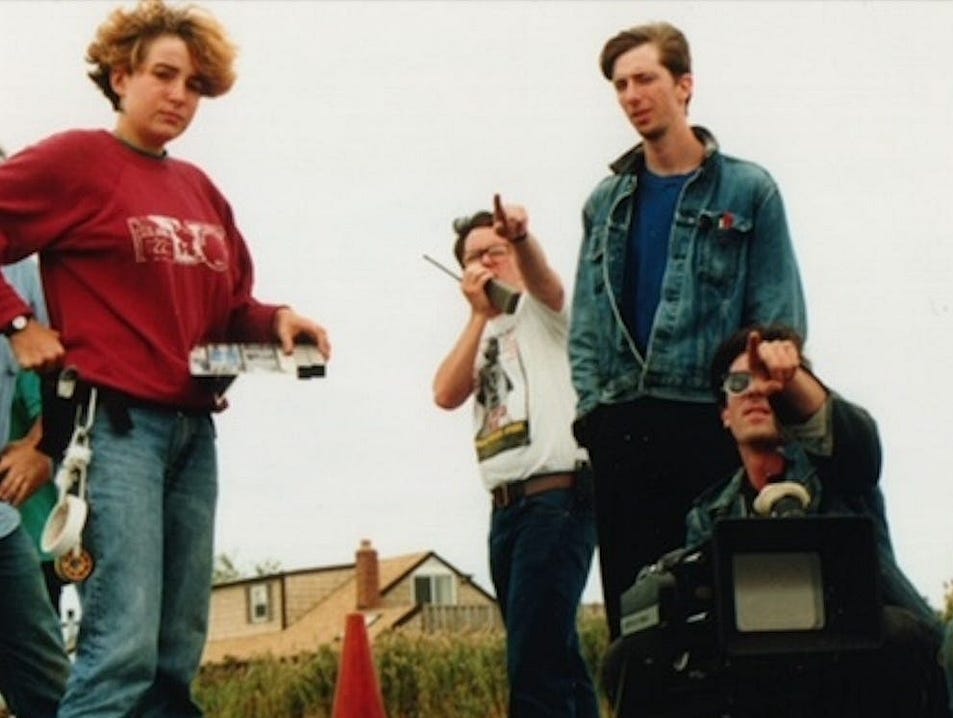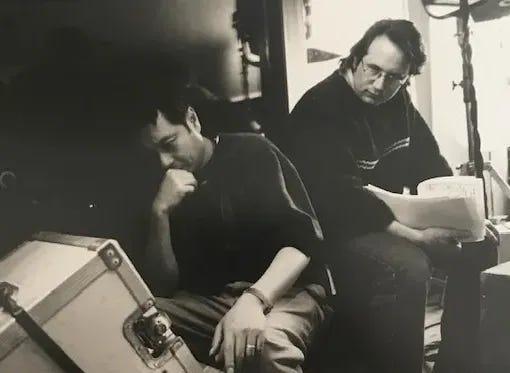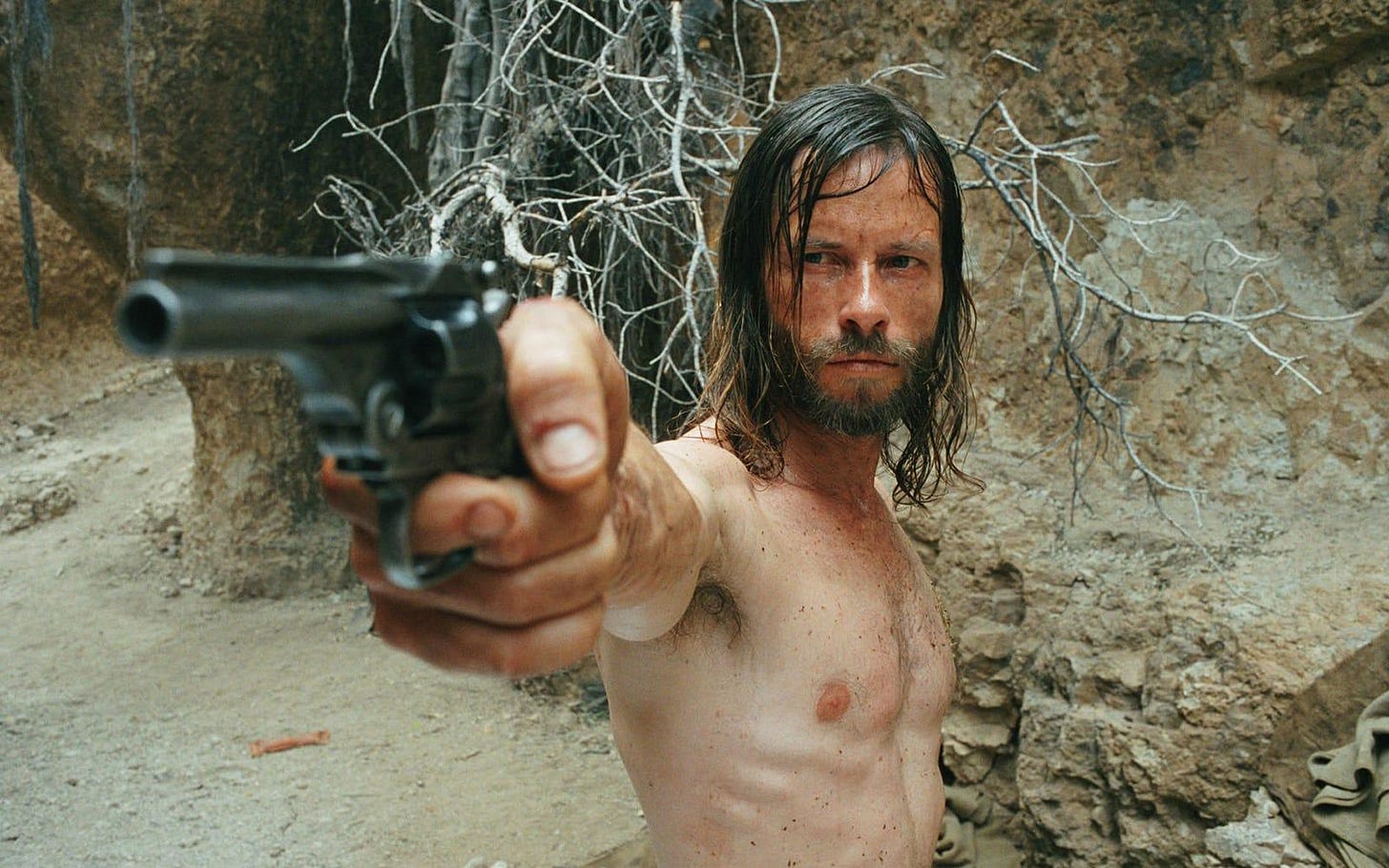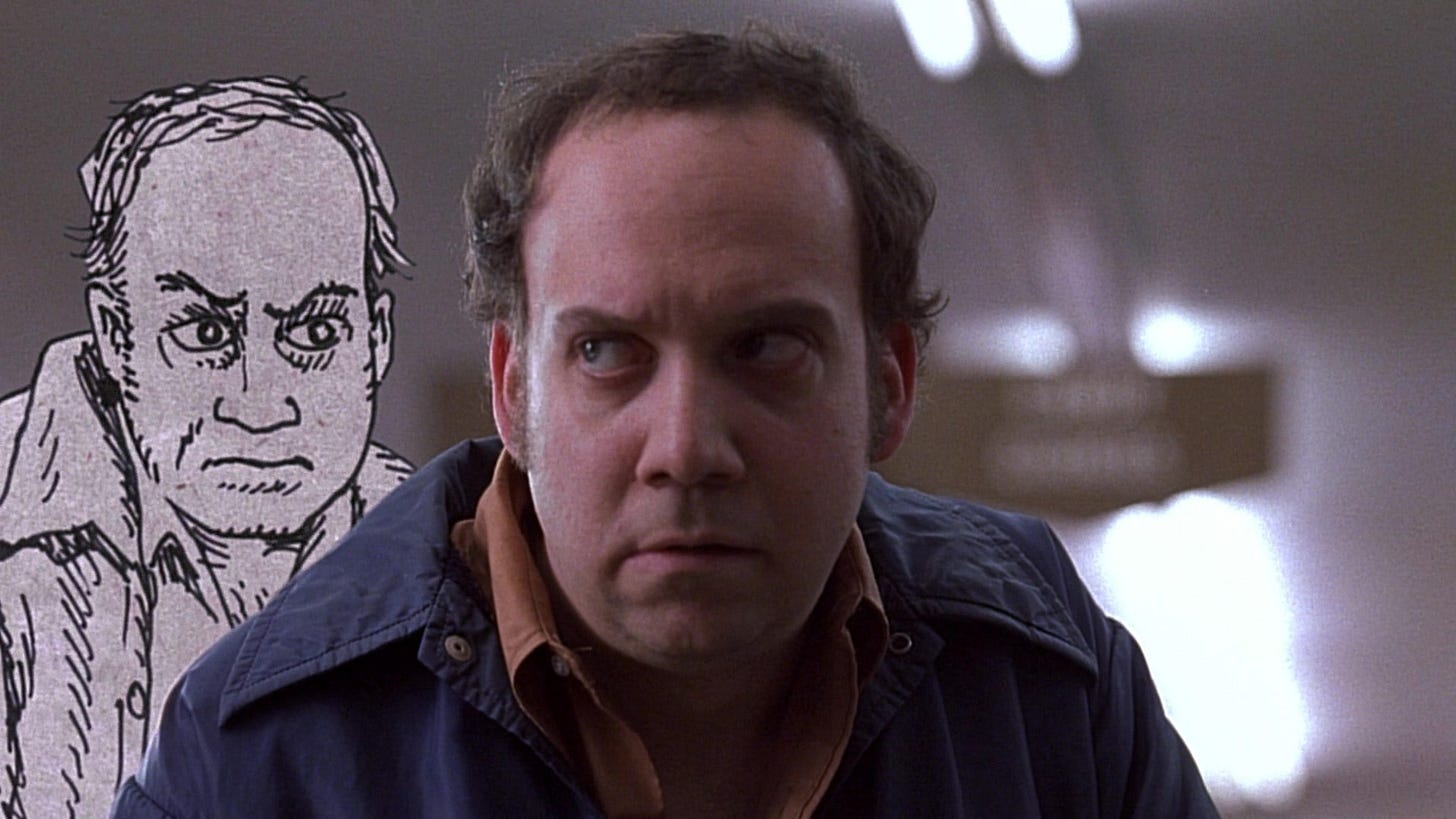The Case for Challenging Movies in Uncertain Times (Part 2)
A wide-ranging conversation with legendary producer TED HOPE about instincts, innovation, and building a better future for film

Underexposed is a weekly film rag celebrating under-the-radar gems and the culture of moviegoing. It’s 100% ad-free and powered by readers like you.
A paid subscription gets you access to exclusive essays, bonus videos, and more.
There are moments in history we associate with a name. In the ancien régime, it was Louis. In the age of conquest, it was Alexander.
In the digital age, it’s Ted.
Say the name once, and Ted Kaczynski appears - the Unabomber - scribbling manifestos by oil lamp, warning that the rise of unchecked tech would gut human freedom and drain life of meaning.
Say it again, and you conjure a carpeted stage in Sunnyvale - a TED Talk - where a man in a turtleneck pledges to fulfill Kaczynski’s bleakest prophecies to a sea of barking sweater fleece.
Say it a third time, and Netflix CEO Ted Sarandos materializes to casually declare cinemas “outdated” as he greenlights Electric State 2: Apocalypse Slop Boogaloo.
At this point, you might be tempted to stop summoning Teds - especially if you love movies. But you must say the name again. Twice.
When you do, two better Teds appear - armed not with mail bombs or killer apps, but with Substacks: Ted Gioia, who fights for the soul of art on The Honest Broker, and Ted Hope - producer, oracle, and patron saint of American independent film.
Hope describes himself - accurately, but inadequately - as a “filmworker.” He helped launch the careers of Ang Lee, Todd Field, Nicole Holofcener, Todd Solondz, and Michel Gondry. He’s produced over 70 films, been a studio exec on 60 more, co-led three production companies, and, oh yeah - helped build Amazon’s feature film division from scratch, landing 19 Oscar nominations and 5 wins, while his own films have received 25 nominations and 6 wins. That’s a lot for one filmworker, let alone ten.
His Substack, Hope For Film, has become a central hub in a growing constellation of newsletters we’re calling Filmstack. It is here that the name Ted has been reclaimed, and the grim portents of past Teds are being challenged.
Yesterday on Hope For Film, Ted Hope invited me into a wide-ranging conversation about movies and moviegoing. Like all good chats, it spilled into the street. Now we’re back at my place for Part Two. You can read Part One here.
Alex: You’ve produced a huge range of work - some of it fiendishly provocative, like Todd Solondz’s Happiness. How do you navigate that tension between uncertainty and clarity when you’re deciding what to back or develop?
Ted: With any new project, and whether I am a producer or an executive on it, the first aspect is whether I think the project will continue to fascinate me the more I get to know it, which of course includes the people involved. I have to assume anything is a minimum commitment of three years, and a likely one of five or even seven years these days. I can’t risk growing bored with it or the team. And then there is a question of personality. Will I mesh well with the rest of the team, even if it is just the writer or director initially? Who else is likely to get involved? What will that be like?
I am a huge believer in the process – but I have my own, and it may not be for everyone. I shape it around each project and collaborator, so it is not uniform, but it is a method. And sometimes I can see very early on that the others won’t be down for it. It is a mix of relentless curiosity and association. It is a love of layers and puzzles and connections. Why is this here and not that? And ultimately what is the truth behind it?

As a producer, I only want to make things now that I think will be excellent, both as a film and as an experience. Yet of course we can’t see that at early stages of the process, so the uncertainty I am assessing initially is the filmmaker’s commitment. Are they up for the hard work I anticipate?
In the end, it is about trying to stay sensitive and trusting one’s instincts. You never really know, but that feeling is worth a great deal.
Alex: I wish more people talked about the importance of developing one’s instincts. Instincts are becoming dulled because we encounter fewer opportunities to sharpen them. The result, as you touched on earlier, is that people don’t trust their opinions. They develop fewer unique visions for the future, and are poorly equipped to address new obstacles when they arise.
Instincts were what we relied on in the absence of information. But now that we’re drowning in it, many have convinced themselves that instincts are less important now, if not obsolete. How should we be talking to younger generations about the importance of developing instincts, and how should they go about it?
Ted: Ah! I think this is one thing I did well as a parent, and frankly I learned how to do it from being an executive – but one at my own company where other than helping to shepherd the staff and keep the boat afloat, I was free to do what I wanted. The answer is conversation and particularly conversation about what excites you. There is no better place to grow up in America I think than NYC. The access to culture in NYC is phenomenal. Sure, there is no way to resist the materialism that it’s evolution into one giant mall for the super-rich is an issue, as is the indifference the great disparity of wealth generates, but there is so much to get turned onto one’s taste can’t help but to develop. Culture is not something we should ever be passive about. It is not a thumbs up or thumbs down thing. Even if you “don’t like” something – particularly when you don’t – you are going to learn something by analyzing it. You also are going to learn even more by giving someone who feels differently than you room to speak about it. Once you start talking about art – and really that includes games and toys for children – you start to see how our input as both individuals and community is the missing special sauce. It is all about turning on your emotional, intellectual, spiritual, and community-related receptors and understanding how much they are needed to make life truly valuable.
Alex: What was a film you backed that really surprised you - either in how it turned out or how people responded to it?
Ted: The truth is I am struggling to recall when I have really been surprised by a work or even an audience. For that matter, it’s even hard to recall when I was surprised by an artist, particularly one that I was familiar with. I’ve certainly been surprised by a film, particularly when I have had the good fortune to not know too much about it, which is why I love seeing films early, before reviews or social media hit. I get the same rush when there’s a film I’ve been tracking for years but hoping to see on the big screen. That just happened for me with John Hillcoat’s The Proposition. I was expecting to like it, but the level of execution at every level, particularly the characters and performances, and then the setting they were anchored in, was truly thrilling for me, and on the big screen at The Aero in Santa Monica no less.

But on my own films, there aren’t so much actual surprises. There are achievements and disappointments though. I encourage experimentation and risk taking, and thus at every stage you have things that work better than anticipated and some that fare far worse.
Such variations happen mostly in the realm of tone. If we are trying to mix humor and pathos, it is really hard to find the balance, primarily because what you set up the audience’s anticipation to be, and how reluctant they often are to alter that once established. You have to initially set up that you are going to be changing tones and if they don’t feel that, it becomes more challenging to do so. But in establishing it, you diminish the surprise factor so that then distracts from the pleasure that tonal shifts are.
It is one of the things you feel is actually changing overall in cinema culture – the willingness, and perhaps even the demand – for tonal shifts.
I credit the South Korean cinema culture for helping to mainstream it a bit, but you see it in the work of many of their directors and then how well that work has traveled to other cultures. They have had an embrace of strong genres historically, and genre itself – be it horror, thriller, romance – is often a good scaffolding to use when you want to explore such tonal shifts. It’s why you can see this used so well in the American Ambitiously Authored Horror films, like Barbarian and Strange Darling – the genre supports it. Your chains become your freedom.
Alex: I hadn’t considered South Korean cinema’s influence in that way, but you’re absolutely right. Parasite was just voted the best film of the 21st century so far in that New York Times list, and maybe that’s part of why - it taught a global audience to embrace tonal volatility. Being that the world has so much tonal dissonance, this tracks.

Ted: I wonder what other changes in style, structure, or genre you see Alex, currently happening in global cinema culture?
Alex: You’ve already hit on what might be the most important one – the tonal fluency. Otherwise, filmmakers like the Ross Brothers are doing interesting work in the docu-drama space with films like Gasoline Rainbow. I love the way smaller, more accessible cameras and the demand for more authenticity has driven some to tell stories that blend professional and non-professional actors, and blur documentary and fiction. With this neorealist style come stories that focus on characters on the margins, the antithesis of what a lot of streamers are producing – glossy shows about rich people. I don’t doubt there is so much going on out there that I don’t know about, and I am eager to discover it.
Ted: Yeah, both their films Gasoline Rainbow and Bloody Nose, Empty Pockets were exciting movies for me to see. And I love seeing artists find (and then evolve) their style. Too often these days I think the business encourages us all to keep repeating ourselves. I’ve felt this during my time as both a producer and an executive. I am capable of far more than I have done. I am type cast as someone who does “prestige” tales of true life human endeavors. But I started in horror. And I like to experiment in form. I so dig adventure films and extremely silly films and epic love stories – but the business would rather I repeat myself. I wish we had a mandate to evolve the stories we tell and how we tell them? I wish there was a way to more encourage experimentation… take bigger risks… I wish we had an early-stage Godard working regularly and supported widely.
Alex: Me, too! I’d take a late-stage Godard, at this point. Any Godard, really. It’s amazing what a filmmaker like Steven Soderbergh has achieved in a wide range of styles and budget ranges, and sad that we don’t have more like him coming up.
Ted: I am with you, Alex, and I wonder if we can spot some of the reasons. For instance, going beyond the acquiescence-to-the-short-attention-span trend in cinema, I wonder if you see also a simplification in the communication that is going on in our current cinema. I feel the frames hold less than they used to. Themes are simpler, and the ideas are all single-sided and flat. What’s up with all of that? How did we get into such a sorry state?
Alex: Absolutely, Ted. The “flattening” of cinema is a trend that now sadly cuts across both mainstream and so-called arthouse films. It’s an odd state of affairs, considering that filmmakers presumably consume more moving images than ever, but seem to have become less visually literate, in the sense that their films are not as artfully blocked and subtextual as they once were, and the stories themselves contain less ambiguity and far fewer ideas.
Ed Williams has written about this eloquently in his Rough Cuts Substack, noting the “wallpaperization” of cinematography: how images have been optimized more for Instagram than for narrative or emotional resonance. He also explores the rise of “second screen movies,” films designed to be semi-watchable while the viewer is also on their phone. That alone explains why the ideas are simpler and shallow.
Ted: Vanessa and I are now watching Adam Curtis’ latest series Shifty each night before bed. He made it for the BBC but it is on YouTube here. He’s a great artist, historian, and cultural critic. And he experiments. YouTube categorizes his work as “vegetive streaming” but I don’t know what that means. I suspect it assumes we use a second screen or we are somehow numbed into submission – but his work is so fucking alive. He does things that feel like we’ve been taught are forbidden but he makes them work beautifully. His editing and use of music, selection of imagery – it is stunning. And the ideas are profound. If that is encouraging a vegetable state, I want more of it.
Alex: Adam Curtis is the best, isn’t he? I have watched his docs repeatedly over the years, and I’m eager to watch the new series. As for how we got here… Neil Postman observed back in 1985 that television’s bias is toward immediacy and simplification. That same logic has overtaken film. With the rise of GSPs, we’ve built an ecosystem that punishes complexity, ambiguity, and silence, and rewards clarity, simplicity, familiarity, and speed. It’s a system that no longer rewards ambition if it doesn’t fit onto a thumbnail.
Also, you can draw a line back to the rise of test screening, which was formalized in the 1970s. I have ambivalent feelings about test screenings – I see their potential value, and trust they have made some films better, while sanding the edges off of many others and entitling audiences in ways that *may* have damaged the art form. Ted, what are your feelings about test screenings and audience analytics?
Ted: I think test screenings and audience analytics get a bum rap. The culprit is the executives who don’t understand their job and how they use them to persuade the filmmakers. The people that run the test screening companies are generally pretty great, or least most of them are. We must recognize that if we listen to what people want, it is the equivalent of toddlers wanting candy. The oversimplification of the results contributes significantly to the flattening of culture. There are ways to better understand what they are reacting to. When someone doesn’t “like” a scene or character or element, what they generally mean is that they did not feel prepared for it. It often has more to do with what came before it than the thing itself.
Movies are a directed conversation with the audience, among other things. But as they are a conversation with a distinct perspective, even if we are leading the audience, it is a two-way dialogue. Unfortunately, if you make something outside of the corporate system, and particularly if you are not yet integrated into a local film community, often you think you “finish” your film before you screen for an audience. You don’t want your premiere to be your first test screening. In any creative process, we need feedback and we need feedback from different communities. The hardest thing I find about making movies is keeping fresh eyes as we iterate, be it a script or a cut. Audiences are accessible fresh eyes.
Alex: Regarding the future of cinema, am I naïve to think a microbudget, self-distributed feature movement is possible? What roadblocks do you see, if any, that I am not considering?
Ted: Yeah, I want that too. NonDē, friend, NonDē! The roadblock is we built the wrong system, that is if anything was built and there is even a system. Sundance was such an important addition to the ecosystem when it launched. It gave us some infrastructure to launch artists outside of the corporate dictates. It’s success however locked it into legacy practices that are now holding us back.
As others have pointed out – and I love to emphasize -- in any closed ecosystem with the dominant capital or power – and/or the audience – generally feels it is “good enough”, funds will not be invested in improving either the product or process, as the opportunity costs are such that it makes sense to place your bets elsewhere. As a result, over time, without those needed operational improvements, everything diminishes, and the audience migrates, and the business stagnates. In other words, welcome to today in the cinema industries. This is also a great opportunity to build something better.
As we discussed earlier, this entire cultural industry has become focused on the financial transaction and that has a perverse effect in reducing opportunity, innovation, and revenue. We must make a non-dependent cultural ecosystem where the participants don’t look to “enter the big leagues”, where it is not about “one film at a time”, where the individual comes before the community.
I have a whole plan for it. I’d like to build it, but I don’t think I can get it funded currently. I am refining it further, and looking for the right partners, but it is a bit like the moon program. You could say that my three years on Substack with my newsletter has been about getting folks a bit better primed for it.
Alex: Well, consider me primed – and grateful for your incredible contributions. I have high hopes for the next few years, can’t wait to see what you’re cooking up, and look forward to more discussions like this with you in the future.
Ted: Here, here. I am truly excited for all the ways that FilmStack can be that leaderless community that advance both the ambition and the support for all cinema can be. We sure as hell need it.
News Reel
“Americans want to go back as far as they can, even if it turns out to be only last week. Not to face now or the future, but to face backwards,” Gil Scott Heron once said. His words resurfaced last week in The Guardian’s latest dispatch in the ever-expanding “Hollywood is Dying” genre, this one titled Reboots and Remakes: Why Is Hollywood Stuck on Repeat? : “This is an industry in freefall, clutching at the surest things in sight as it scrabbles to regain footing after Covid – which closed about 8,000 screens worldwide, half of them in the US – and the nearly six-month strikes of 2023 and subsequent dearth of content.”
Following a lively chat with
this week live on Substack, Black List founder posted a “quick and dirty” Hollywood syllabus, which includes everything from Aristotle’s Poetics to the 2009 Netflix Culture deck.- is back with four more solutions that could transform how we experience movies forever: “Imagine a model where theatrical releases feature extended cuts or filmmaker commentaries unavailable elsewhere. Then, when the film transitions to premium VOD, it debuts with supplementary content specific to at-home viewing. By the time it reaches subscription streaming, perhaps it includes platform-exclusive making-of documentaries. Each phase would provide unique value instead of cannibalizing the previous one, a model that treats viewers not as content consumers but as cultural athletes building different aspects of their appreciation through varied exposures.”
And finally, this week’s Underexposed Movie Pick -
What Happened Was… (1994, Dir. Tom Noonan)
“It’s weird having you here, that’s all,” Jackie tells Michael, her awkward paralegal coworker, ten minutes into what is technically their first date. She’s invited him to her loft to eat scallops - perhaps unwisely, we fear - as the two grope for common ground across a table strewn with emotional landmines. Michael reveals he is secretly writing an exposé that will take the firm down. “There’s so little real love in any of the work that I see,” Michael fumes as Jackie retreats to the kitchen to busy herself with the dishes. Then Jackie reads aloud a strange and wonderful short story she’s written - an act of intimacy that upends them. “It seems like something broke in me a long time ago,” he later confesses.
I’ve come to admire contained “chamber” movies more with time, particularly those like What Happened Was…, which heighten inwardly with subtle but bruising detonations. Written and directed by Tom Noonan, the film is a stress-forged jewel of quiet desperation. It’s a crackerjack screenplay - winner of the Grand Jury Prize and Waldo Salt Award at Sundance - brought to life by killer performances, sly blocking, impressionistic camera work, and the well-timed mournful intrusion of city noise.
I’d count What Happened Was… among my favorite New York movies. Roger Ebert complained the characters lacked mutual awareness, that both seemed to be “playing their own tapes” - but this, to me, is exactly what makes What Happened Was… feel so truthful. Maybe even more truthful in today’s world. You can watch it now on Plex.
That’s all for this week. Thank you for reading. See you next Friday,
Alex









This two-part conversation was really fun to do with you Alex, and I love that you recommended WHW (I think that was the first film I helped that won Sundance) this week, featured American Splendor (the third film I produced that won Sundance -- and recently cited by another Ted as one of his faves on the creative process), and sourced such great photos of me in my youth. Would write more, but I have to get back to work building that NonDē scaffolding!
So much gold in this entire interview, and applicable beyond film, too. Thank you.